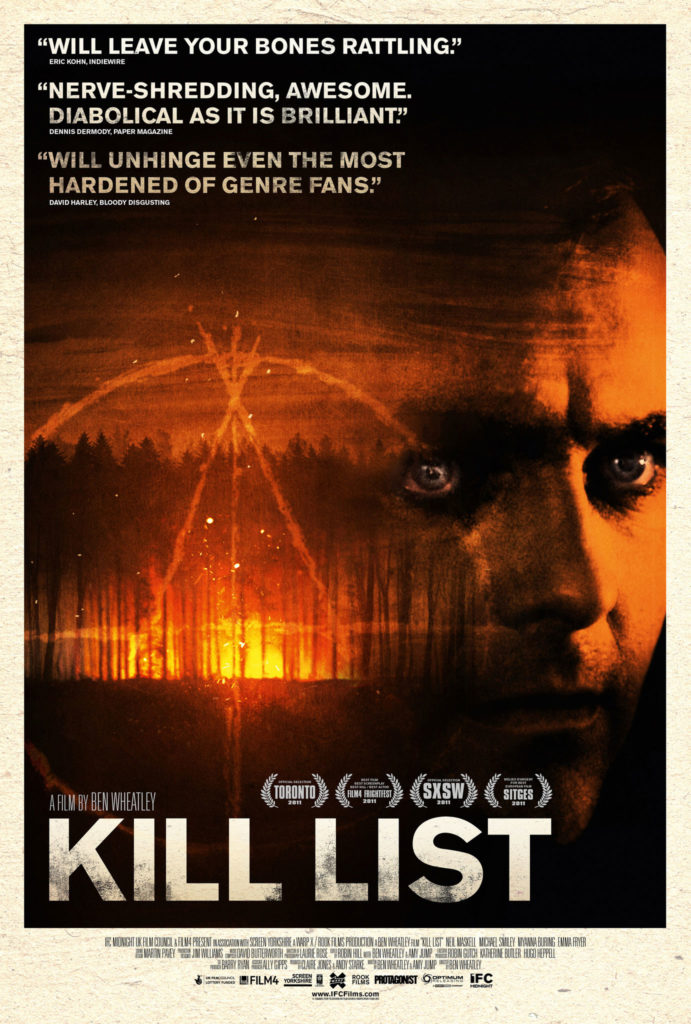Kill List, Ben Wheatley’s intense film from 2011, is impossible to classify. After having seen it, it continues to exist in my memory as an attack on convention, and an attack on my innate need to shove a film into this or that genre. It would be easy to just write that the film is a British crime drama, but nothing about this film is easy.
Jay (Neil Maskell) has a problem. He hasn’t worked for the past eight months, and his family is now out of cash. He and his wife, Shel (MyAnna Buring), love each other very much, but the financial stresses are leading to epic arguments. After a disastrous dinner with Jay’s best friend Gal (Michael Smiley) and his girlfriend Fiona (Emma Fryer), the audience learns that Jay and Gal are a pair of hitmen. Knowing Jay is desperate for money, Gal convinces him to partner up again, and the two take on a series of jobs from a mysterious man who seals the contract in blood.
Despite that description, Kill List never presents itself as anything so simple or conventional. Films about mobsters and hitmen usually stay within genre conventions, and they rarely challenge a viewer’s sense of just what it means to be entertained by violence. We like violence. We like criminals. As long as they both stay on the cartoonish side of believability. Ramp up the grit and a filmmaker can point to their work’s realism while still maintaining a vast gulf between it and what constitutes real violence. Kill List does something different. It doesn’t  pretend to be a snuff film. The violence is more graphic than most films, but that’s not the way this film challenges a viewer. Rather, the film is bathed throughout with an ominous tension. The life that Jay and Shel have built for themselves is sustainable only through evil acts. It is precarious, and will inevitably fail. In the meantime, people have to die, and Jay and Gal dispatch them with ruthless efficiency.
pretend to be a snuff film. The violence is more graphic than most films, but that’s not the way this film challenges a viewer. Rather, the film is bathed throughout with an ominous tension. The life that Jay and Shel have built for themselves is sustainable only through evil acts. It is precarious, and will inevitably fail. In the meantime, people have to die, and Jay and Gal dispatch them with ruthless efficiency.
But, there’s yet more happening beneath the surface. The viewer gets a first glimpse at the true machinations driving the story when Fiona carves a strange symbol on the back of Jay and Shel’s bathroom mirror. That event, and the weirdness that Jay and Gal encounter while out on their jobs, lets the viewer know that the hitmen angle is only part of a larger story. What that story is is left to the viewer to unravel. I won’t spoil it here, nor am I sure that I could, but I can say that Kill List is one of the most bizarre mind-fucks I’ve ever seen in film. Usually reserved for sci-fi, making narrative leaps designed specifically to confuse the viewer is always a gamble, but Kill List does it well.
The intensity and the strangeness wouldn’t work if the cast weren’t up to the demands of the script. It all starts with Jay. Maskell is not an imposing fellow at first glance, but the vast majority of the film’s uneasiness comes straight from him. He’s a killer, sure, but it’s the fire lurking underneath in the moments when he’s not out on a job that make him frightening. He never gets unhinged. Everything is considered and controlled, even when he is threatening a man who made the mistake of bringing out a guitar in a restaurant. I got the feeling from Jay that he would blow up the world if given the choice.
Smiley and Buring are the two who have to play off of Maskell’s performance the most. It takes a certain type of person to be able to exist in Jay’s orbit. It only fits that one is a killer like Jay and the other is the only person on the planet that could make Jay feel like less of a man with naught more than a simple look.
It’s rare to see a film with such perfect casting in its most important characters. Sure, there are plenty of films that stuff serious talent at the top of the cast (I’m thinking of American Hustle as I write this), but Kill List is not about the cast. As viewers of this film, we’re not supposed to swoon while Oscar winners or contenders ply their trade. This cast’s purpose is to draw us in to a very bizarre story and guide us through. They did.
Kill List is not the easiest of watches. A short running time helps out a lot, but the constant oppressiveness can wear. I didn’t have to work to get through the film too much, but I could see how it would be a struggle for many viewers. I could write more about how the plot works, maybe give away a bit more about where it goes. It’s not that I won’t do that. I can’t. Kill List is not a typical narrative. No matter how a viewer feels after watching, they will be convinced they just saw a film unlike any other.
